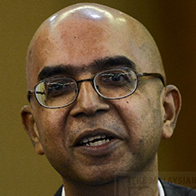In a parliamentary democracy, the Speaker of Parliament plays a very important role. He is responsible for managing staff, buildings and records; for reviewing and paying expense claims submitted by Members of Parliament; for orderly conduct in Parliament.
Orderly conduct includes setting and enforcing the agenda for each sitting, providing enough time to read, debate and vote on bills and to answer written and oral questions; rebuking and punishing “unparliamentary conduct;” allotting and enforcing time for speeches; managing interruptions – and the list goes on.
The Speaker must be non-partisan. He mustn’t favour any party. He must be the conscience of Parliament, the one who best understands the reason Parliament exists and the harm which will be done to the nation if the work of Parliament is undermined.
Why is there a Parliament?
There are very few politically literate citizens in our nation. If we could find them and ask them what Parliament does, they will most likely say that the work of Parliament is to make laws. Yet, that is not the primary work of Parliament.
The website of the British Parliament stresses 4 of its functions. The first is “check and challenge the work of government (scrutiny).” It is important not to miss the significance of placing this in first place: the first and most important work of Parliament is scrutiny, which means a close examination of the work of government.
The other 3 functions listed are “make and change laws (legislation);” debate the important issues of the day (debating);” and “check and approve government spending (budget/taxes).”
Clearly, contrary to what even politically educated Malaysians would say, the most important work of Parliament is NOT the making and changing of laws. Scrutiny, debate and checks are as important as, if not more important than, the work of legislation.
Politicians, whether they are on the government or the opposition side, have a tendency to think of themselves as steering a ship – determining its character, destination and speed – by manipulating civil servants.
Politicians favour the steer/manipulate model because it is the model favoured by the businessmen who fund them. (Dr Mahathir, Malaysia’s autocrat-par-excellence, best used the model. Under him, the work of Parliament was crystallized and embedded: give autocracy a democratic aura; NEVER scrutinize or check the government.)
Michael Oakeshott, an English political theorist who placed great emphasis on learning from history, challenged the steer/manipulate model. He said history informs us that Parliament must limit political power and protect citizens against tyranny.
Oakeshott proposed an alternative model. He said politicians must be made to recognize that we sail “on a boundless sea with neither harbour for shelter nor floor for anchorage, neither a starting place nor appointed destination.” He warned against treating complex situations with simple formulas. He urged politicians to embrace complexity.
In Malaysia, we too often think of the Speaker’s role as administrative, bound by a rule book, the little blue book, the book of Standing Orders.
We need instead to ask what political philosophy guides Pandikar Amin when he finalizes the agenda for each sitting; when he moderates debates; when he proposes reforms.
The Speaker is vitally important to the wellbeing of the nation. He is to Parliament what the Agung is to the nation. That’s why there is so much pomp and ceremony around the Speaker, extending to the regal clothes he must wear.
Does Tan Sri Datuk Seri Utama Pandikar Amin live up to expectations? Who measures his performance? He’s even said Parliament is a rubber stamp for the executive! Is he frequently on the lecture circuit, expounding what Parliamentary democracy means?
Our Speaker is, for all practical purposes, appointed by the Prime Minister – even Parliament’s budget is disbursed by the PM. Our Speaker essentially serves at the pleasure of the Prime Minister!
We would do well to consider the British practice. Their Speaker is an elected MP who must quit membership of his party as soon as Parliament elects him Speaker.
If he wishes to run for another term as MP, he must run on the basis of “Speaker seeking re-election” and all parties typically decide not to field candidates against him.
What greater sanction can there be of his performance as Speaker?
In his campaign for re-election as MP, his claims will include his “results” as Speaker.
When John Bercow ran for MP on the basis of re-election as Speaker after 6 years in that office, his claims included “only 7 MPs claimed less than me in expenses and the year before, only 13 were less costly to the taxpayer” and “I have led the drive to replace the discredited expense system, reform Parliament and reconnect with the country as a whole.”
After 7 years in office, what results can Pandikar Amin claim? – November 12, 2015.
* This is the personal opinion of the writer or publication and does not necessarily represent the views of The Malaysian Insider.


Comments
Please refrain from nicknames or comments of a racist, sexist, personal, vulgar or derogatory nature, or you may risk being blocked from commenting in our website. We encourage commenters to use their real names as their username. As comments are moderated, they may not appear immediately or even on the same day you posted them. We also reserve the right to delete off-topic comments